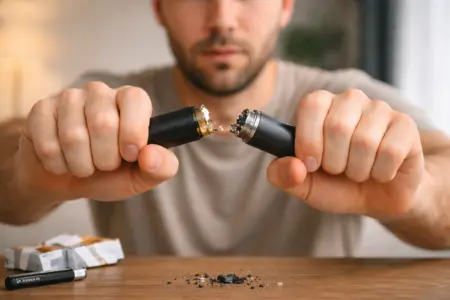Giving up vaping can be difficult, especially if you are used to having nicotine every day, but deciding to stop is a rewarding choice for your overall wellbeing. This guide will help you understand how to quit vaping and what to expect, with some practical tips and guidance to help you manage cravings and withdrawal […]
Addiction Resources
Binge Eating Disorder Help
What is Binge Eating Disorder? Binge eating disorder is a diagnosis given when persons repeatedly overconsume quantities of food to the point of feeling unwell, and who experience the feeling that they have lost control over how much and/or what they are eating. Binge eating disorder is different from bulimia in that the episodes of […]
Salvia Addiction Treatment
Salvia (Salvia divinorum) is a plant of the mint family common in southern Mexico and Central and South America. Other common street names are Leaves of Mary, the Shepherdess, Shepherdess’s Herb, Maria Pastora, The Female, Sage of the Seers, Diviner’s Sage, Diviner’s Mint, Sally-D, and Magic Mint. Salvia is a dissociative hallucinogenic drug. Its main active […]
Polysubstance and Polydrug Addiction Rehab Treatment
At Castle Craig, we offer residential polysubstance addiction rehabilitation treatment designed for people using multiple substances at once or over time. Our clinical team is highly experienced in managing the complex interactions between different drugs, tailoring detox and therapy plans to address both the physical and psychological challenges of polysubstance use disorder. Set within a […]
Addiction and Depression Rehab Treatment
Living with depression or major depressive disorder alongside substance addiction can cast a heavy shadow. People often turn to drugs or alcohol seeking relief from a low mood, only to find that the addiction deepens their despair. At Castle Craig, we have helped people navigate this challenging dual diagnosis for over 35 years in the […]
Not Ready for Rehab?
Joining a rehab programme can be a life-changing experience and admission to residential rehab is usually a straight-forward process. However for many reasons people can feel that they aren’t ready for rehab or that there are barriers to overcome before they can start treatment. Barriers to Rehab Denial – addiction is characterised by denial, a […]
Stomach Pain After Drinking Alcohol
Why Does My Stomach Hurt After Drinking Alcohol? A stomach ache after drinking alcohol might seem harmless or a nuisance, but it could be a sign of something more serious. You might have a problem called alcoholic gastritis. What Is Alcoholic Gastritis? Gastritis means inflammation of the stomach. The word gastritis comes from gastric which […]
Pregnancy and Alcohol Risks: Foetal Alcohol Syndrome
Foetal Alcohol Syndrome (FAS) is a medical condition that occurs when babies are exposed to alcohol in the womb. It is part of a larger group of medical disorders called Foetal Alcohol Spectrum Disorders (FASDs). Foetal Alcohol Syndrome is one of the more serious FASDs. Foetal Alcohol Syndrome can cause significant physical symptoms, learning difficulties, […]
Is Alcohol Giving Me Insomnia? How Alcohol Affects Sleep
The Link Between Alcohol and Insomnia Many people see alcohol consumption as a promoter of drowsiness. However, the opposite may be true. The build-up of tolerance and its effect on brain chemistry can disturb sleep patterns within a relatively short time. Regular heavy alcohol use is likely to disrupt sleep patterns seriously. Alcohol is a […]
How Can Alcoholic Parents Affect a Child?
Dealing with alcoholism isn’t easy for anyone. It can be especially tough when the alcoholic is a loved one, and more so when that loved one is a parent. While growing up isn’t easy for anybody, growing up with an alcoholic parent can take a long-lasting toll on one’s well-being. Decades of studies have shown […]
Does Alcoholism Increase Your Risk of Cancer?
Can drinking too much cause cancer? Around 1000 new cases of cancer are diagnosed every day in the UK.1 Cancer is a devastating disease, and it’s important we understand what lifestyle choices put us at risk. One of the biggest cancer risk factors that we can change is our alcohol consumption. Did you know that […]
Does Alcohol Make Your Sweat Smell?
If you are regularly dealing with night sweats, alcohol body odour or bad breath, this is the article for you. Here we’ll take a look at exactly why consuming alcohol causes these issues and why dealing with them regularly could be a sign that you need some support. Alcohol Odour and Alcoholism Wondering how consuming […]
